Peter Thiel is a Vampire
The Strange Story of Peter Thiel – Part Three
by James Corbett
corbettreport.com
November 10, 2024
If you've read "The Strange Story of Peter Thiel," then you'll know all about how this deep state-connected "PayPal Mafia" don rose to financial prominence on the back of his remarkable ability to found companies that either undergird the digital financial infrastructure (PayPal) or act as cutouts for the intelligence agencies (Palantir).
And if you've read "Buying Politicians is Easy," then you'll know all about how Thiel has leveraged his ill-gotten wealth to buy himself real-world political clout. And you'll also know all about how he has wrapped the silicon tentacles of next-gen military contractors like Palantir, Clearview AI, Anduril and other Thiel-founded, Thiel-funded and Thiel-adjacent companies around the globe by signing contracts with foreign militaries.
But after learning all of this, we're still left with some important questions. Namely:
What (beyond the sweet smell of deep state blood money) motivates Peter Thiel?
What ideology does he hew to?
What is his endgame?
In other words: Who is Peter Thiel and what is his real role in the deep state?
Let's find out.
Steering Bilderberg
Yes, as we learned last week, buying politicians is a trivial pursuit for a power-seeking billionaire like Peter Thiel.
And perhaps that's the point. Those of us who understand how power really operates in our modern "liberal democracies" know that realpower is not to be found in any political office—even the Oval Office. Thiel himself has admitted as much:
I think calling our society a democracy, whatever may be good or bad about democracy, is very, very deeply misleading. We’re not a republic. We’re not a constitutional republic. We are actually a state that’s dominated by these very unelected, technocratic agencies.
Or, as BlackRock CEO Larry Fink put it even more starkly last month:
I'm tired of hearing this is the biggest election in your lifetime. The reality is over time, it doesn't matter. [. . .] We work with both administrations and are having conversations with both candidates.
The true measure of Thiel's position in the deep state, then, is not the extent to which he will wield power in the coming Trump administration through his bought-and-paid-for minion, J. D. Vance—significant as that power might be.
Rather, the measure of Thiel's deep state status comes from his role in the premiere deep state institution: the Bilderberg Group.
The Bilderberg meeting is, of course, one of the yearly highlights of any budding globalist's calendar. The annual conference brings together 150 or so of the wealthiest and most influential businessmen, financiers, tech oligarchs, heads of state, military planners, globalist super-gophers and royalty from Europe and North America (and, increasingly, from around the world) to conspire for three days in total, closed-door secrecy at a five-star resort somewhere within driving distance of a major European or North American capital.
To be invited to Bilderberg once is surely a sign that a young globalist's deep state star is in the ascendant. To be invited a second time is a signal that one has arrived. But then there is the crème de la crème of this global cabal—the steering committee members who organize the conference and decide who will or will not be invited to each year's meeting. Past steering committee members have included such deep state stalwarts as David Rockefeller, Joseph Retinger, Prince Bernhard, Henry Kissinger and Edmond de Rothschild. And, as you might have guessed, Peter Thiel sits on the current Bilderberg steering committee along with Alex Karp, the CEO of Thiel-founded Palantir Technologies.
Given the wall of secrecy that surrounds Bilderberg—remember when Dan Dicks and Luke Rudkowski got arrested for merely approaching members of the steering committee in a hotel lounge in Copenhagen in 2014?—the precise details of when and how Thiel acceded to the steering committee are unknown. We can definitively state that he has been a member of the steering committee since at least 2019 (the point at which the earliest backup of the official steering committee member list was made on The Wayback Machine), but beyond that it's impossible to tell when he first joined the committee.
However, we do know that since 2010 Thiel has been a Director of the "American Friends of Bilderberg"—a group that tasks itself with "organizing and sponsoring conferences which study and discuss significant problems of the Western alliance" and with "collaborating on the Bilderberg Meetings held in Europe and North America" and whose board has boasted such luminaries as Henry Kissinger, David Rockefeller, Richard Perle, James Wolfensohn and Vernon Jordan.
We also know that:
Thiel has been on the participant list for Bilderberg every single year since the Bilderberg Group started releasing official participant lists in 2007;
Karp has joined Thiel as a Bilderberg invitee each year since 2012; and
fellow Thielversians are frequent invitees to the Bilderberg festivities.
Those Thielversians and PayPal mafia members who have made appearances at Bilderberg under Thiel's steering committee reign include:
Reid Hoffman, a founding member of PayPal's board of directors who has a long history with Thiel;
Palmer Luckey, the teenager who created the Oculus VR headset that Thiel funded into existence and who now runs the Thiel-funded Anduril Industries, which makes (as National Propaganda Radio puts it) "AI weapons for Ukraine"; and
Kevin Harrington (the managing director of Thiel Capital).
Unsurprisingly, the only journalists to ever directly question Thiel about his participation at Bilderberg were a gaggle of independent reporters who braved arrest and assault to cover Bilderberg 2016. Questioned by Luke Rudkowski of We Are Change about the seeming contradiction between his professed "libertarian" values and his participation in a closed-door meeting conspiring with government officials and their financial backers, Thiel served up a hefty portion of this awkward word salad:
Or, transcribed:
I believe that it's always important to exchange views with people . . . uh, no matter what their perspectives are. . . . Uh, I believe that uh, I'm, you know, I . . . I . . . I think that, uh . . . I think that we have a lot of problems in our society and we need to be . . . uh finding ways to talk to people who need to find ways to talk to people . . . uh, where not everything is completely transparent. Libertarianism is not synonymous with radical transparency. That's often an argument that the Stasi would make in East Germany, where, uh, everything had to be monitored by, uh, by society. And I think often you have the best conversations, uh, in smaller groups where not everything is being monitored. And that's how you can have very honest conversations and how you can think better about the future. Thank you very much.
<sarc>Uh, I . . . I . . . I think that that's a very, a very, uh, candid and frank statement by, uh, an individual who . . . uh, is not thinking about what platitudes to mouth, and uh . . . I completely agree with his, uh, with his assessment.</sarc>
More seriously, whether or not libertarianism is synonymous with "radical transparency," it is certainly not synonymous with financiers, heads of state, government contractors and other taxpayer-funded oligarchs conspiring behind closed doors about how best to steer the deep state, arm militaries around the globe and surveil citizens in the name of political power and personal profit.
So, where on earth did people get the idea that Peter Thiel is a libertarian, anyway?
Why, from Peter Thiel, of course!
The (Mis-)Education of a (Fake) Libertarian
In 2009, just as he began his dive into the political waters, Thiel penned "The Education of a Libertarian," an essay in which he declares in no uncertain terms that he is indeed a libertarian and has been since his youth.
He devotes the bulk of the essay to explaining how he spent his student days at Stanford trying to bring about a libertarian awakening through political activism but has since learned that political activism is useless and that the real solution is to be found not in engaging in politics but in escaping politics.
He concludes:
I suspect that the mode for escape must involve some sort of new and hitherto untried process that leads us to some undiscovered country; and for this reason I have focused my efforts on new technologies that may create a new space for freedom.
And what areas of technological advancement has Thiel chosen to focus his supposedly "libertarian" efforts on? He names three: cyberspace, outer space and seasteading.
(Yes, that's "seasteading," as previously promoted by Milton Friedman's grandson, Patri, who has since ditched the seasteading dream to start a new venture capital firm—with seed money from Peter Thiel, naturally . . . but that's a whole other story.)
Although the essay seems fairly old hat to readers of The Corbett Report, it had two important effects at the time.
Firstly, Thiel's lament that "the extension of the franchise to women" has "rendered the notion of 'capitalist democracy' into an oxymoron" gave plenty of pundits fodder for their obligatory "Look at this disgusting libertarian!"-style editorials. In fact, it continues to this very day to provide easy cut-and-paste editorials for finger-wagging, context-destroying online pundits despite Thiel's attempts at damage control.
Secondly, the essay cemented in the minds of the lazy left-wing punderati that libertarianism is . . . well, whatever evil thing they say it is. After all, Peter Thiel is a libertarian ("You see! He says so himself! What other evidence do you need?"), ergo all libertarians are billionaire, taxpayer-funded, surveillance-supporting deep state oligarchs.
See Wired's "The Libertarian Futurism of Silicon Valley Billionaire Peter Thiel" or "The Libertarian Logic of Peter Thiel" or Mannwest's "Peter Thiel: The articulate libertarian" for some prime examples of this phenomenon. Then enjoy laughing at Reason (no stranger to the concept of fake libertarianism) and its shocked pikachu face article, "Wait, Wasn't Peter Thiel a Libertarian?"
This particular form of journalistic idiocy reached its zenith with Inverse's 2016 article on Thiel's Bilderberg membership. In that article, crack Inverse reporter Sarah Sloat somehow manages to both decry Thiel's membership in the conspiratorial Bilderberg group and simultaneously denigrate "conspiracy theorists" for being concerned about said group. She then ends her think piece with the most mind-meltingly stupid statement ever written:
Thiel's allegiance to Bilderberg, which seems to have a libertarian bent, makes sense given his wealth and involvement in companies like Palantir Technologies that collect data on civilians.
Only the intellectually challenged mind of an ideologically blinded and philosophically illiterate zealot—that is, someone for whom "libertarian" is simply a synonym for "anything I don't like"—could possibly conclude that Bilderberg "seems to have a libertarian bent," let alone that that libertarian leaning is reflected in "companies like Palantir Technologies that collect data on civilians" on behalf of the government.
More honest writers are able to admit what should be glaringly obvious to all by now: Thiel is not, in fact, a libertarian, despite what he claims. Even Thiel's biographer, Max Chafkin, is forced to concede that "Thiel was, after 9/11 anyway, no longer much of a libertarian, if he'd ever been one in the first place."
Gee, ya think?
Yet, if we read "The Education of a Libertarian" even more closely, we garner something genuinely valuable from it: a clue to Thiel's actual ideology and his actual motivation. It comes right at the beginning of the essay, where he lays out his own highly idiosyncratic definition of the term "libertarian." According to Thiel:
I remain committed to the faith of my teenage years: to authentic human freedom as a precondition for the highest good. I stand against confiscatory taxes, totalitarian collectives, and the ideology of the inevitability of the death of every individual. For all these reasons, I still call myself “libertarian.”
Ah yes, those classical libertarian values: Opposition to confiscatory taxes! Opposition to totalitarian collectives! And . . . opposition to "the ideology of the inevitability of the death of every individual"?
Wait, what?! What on earth is "the ideology of the inevitability of death for every individual," and what does that have to do with libertarianism, anyway?
Our instinct might be to skim past this line and to chalk it up to Thiel's eccentric, nerdy, sci-fi-obsessed character. But don't. This weird line tells us something important about who Peter Thiel really is.
PETER THIEL IS A VAMPIRE
Back in 2016, Inc. broke a story under the headline "Peter Thiel Is Very, Very Interested in Young People's Blood." It opened with the intriguing lede, "[. . .] if there's one thing that really excites Thiel, it's the prospect of having younger people's blood transfused into his own veins."
Those of us who bother reading past the title (but who's got time for that?!) discover that the story itself is about Ambrosia, a company in Monterey, California, that was then conducting a medical trial titled "Young Donor Plasma Transfusion and Age-Related Biomarkers." The trial sought to establish whether there are anti-aging benefits to the practice of injecting older patients with the blood of younger people.
The relevant part of this story is the revelation that Ambrosia's founder—Stanford-trained physician Jesse Karmazin—received a call out of the blue from Jason Camm, the chief medical officer at Thiel Capital and a "personal health director" to Peter Thiel himself. Sure enough, Peter Thiel's personal health director is particularly interested in life extension technologies.
The Inc. reporter then cites an interview he conducted with Thiel the previous year. In that interview, while addressing the general topic of biotech and life extension medicine, Thiel had given hints about his interest in the blood of the young:
I'm not convinced yet we've found a single panacea that works. It's possible there exist single-point things that could work. I'm looking into parabiosis stuff, which I think is really interesting. This is where they did the young blood into older mice and they found that had a massive rejuvenating effect. And so that's ... that is one that ... again, it's one of these very odd things where people had done these studies in the 1950s and then it got dropped altogether. I think there are a lot of these things that have been strangely underexplored.
Ultimately, the article doesn't come to any grandiose conclusion. It notes that Ambrosia was conducting a clinical trial, not operating a business trafficking in adrenochrome. And even if Ambrosia were engaging in such a business, there is no proof offered that Thiel is actually a client.
Still, it didn't take long for the sensational story to become even more sensationalized in the online retelling.
First, Vanity Fair made the Inc. article's inference more explicit: "Peter Thiel Wants to Inject Himself With Young People’s Blood."
Then, New Republic went full clickbait: "Is Peter Thiel a vampire?"
(Hopefully, the title of this editorial will finally put the question to rest!)
While there is, it must be admitted, no hard evidence that Peter Thiel is an undead creature of the night who flees his coffin each evening to assume bat form and feed on the blood of the innocent, one has to grant that there is no hard evidence that this isn't the case, either (despite his protestations to the contrary)!
Perhaps the more important part of the story, though, is what it reveals about Thiel's mindset. That passing reference to "the ideology of the inevitability of the death of every individual" in his strange definition of "libertarian" was more than just a nerdy quirk. Thiel is, as it turns out, consumed by the belief that technology is on the cusp of "solving" the "problem" of death, and he, for one, plans to live forever. He's even reportedly signed up with Alcor, a cryonics company that promisesto have a "medical team at your bedside" at the time of your death, "ready to start the process" of freezing your corpse at -196° C so it can be preserved and revivified on that glorious day when doctors "cure" death.
Those versed in the transhumanist ideology, predicated as it is on the breakdown of "vitalism"—i.e., the idea that organic life and inorganic matter are fundamentally distinct—will already know where this is going. Parabiosis and cryogenics are just two of the many methods by which the transhumanists hope to transcend our mortal body and live forever in their future cyborg bodies—a key goal of the new transhumanist religion sweeping Silicon Valley these days.
So, what does all of this have to do with libertarianism? Why, precisely nothing, of course! But don't expect any legacy media journalist to ever raise (let alone answer) this question.
And where does that leave us in our pursuit of the answer to the question of who is Peter Thiel?
THE BOTTOM LINE
Let's review:
Peter Thiel founded PayPal where, as PayPal co-founder Max Levchin brags, "we collaborated with every imaginable three and four-letter agency and those were some of the best, most productive relationships I've had as a business person."
He used his role as PayPal CEO to set himself up as the "don" of a "mafia" that continues to rule Silicon Valley (and the world) through their business, government and intelligence contacts.
He took the PayPal fraud detection software (developed in collaboration with those "three and four-letter" agencies Levchin spoke of) and spun off Palantir Technologies, a company that just happened to provide the US intelligence complex with the exact tracking, tracing and data-mining capabilities they needed at the exact moment they were "shelving" their publicly reviled Information Awareness Office.
Thiel then went on to become not just an annual attendee of Bilderberg but also a member of their powerful steering committee, organizing conferences with his Palantir and PayPal mafia colleagues to discuss such topics as "Changing Faces of Biology" and "Continuity of Government and the Economy" in closed-door meetings with his buddies in government, business, finance, media and the intelligence world.
Next he set his sights on purchasing politicians, going all in on Trump in 2016 and securing the orange one's "undying friendship" with a stirring speech about his homosexual Republicanism at the 2016 Republican convention.
After successfully suing the US Army, he then used his position as "shadow president" on the Trump transition team to stuff the first Trump administration with a bunch of Palantir staffers and consultants, eventually securing an $800 million contract from the US Army as well as an ongoing series of contracts to supply targeting systems and weaponry for the military-industrial complex in the US and Israeland Ukraine and elsewhere.
While placing Thielverse associates in high-ranking positions in the Biden administration, he set his sights on the 2024 (s)election, first buying J. D. Vance a US Senate seat for a cool $15 million (the largest amount given to boost a Senate candidate in the history of the United States) then personally effecting a rapprochement between Vance and Trump in a (successful) effort to get his bought-and-paid-for minion installed as Vice President.
All the while he has been using his position as venture capital / hedge fund kingpin to invest heavily in various biotech "advances" and transhumanist life extension technologies.
And, through all this, Thiel has managed to convince the world he is a "libertarian" (a word he has redefined to include opposition to "the ideology of the inevitability of death") simply on his say-so.
With all that in mind, let's return to the opening question in this three-part series:
What do you call someone who identifies as a “libertarian” but who has spent his entire career actively collaborating with governments, militaries and intelligence agencies in an effort to enrich himself and to grow the power of the state?
Personally, I call him an oligarch.
A Silicon Valley technocrat.
A deep state collaborator.
A transhumanist.
A Bilderberg conspirator.
An enemy of free humanity.
Whatever you call him, however, he's surely nota "libertarian."
But don't take my word for it. Now that Peter Thiel's surrogate is one heartbeat (or one gunshot) away from the Oval Office, I have a feeling the public will be learning more about who Peter Thiel really is in the coming years.
Like this type of essay? Then you’ll love The Corbett Report Subscriber newsletter, which contains my weekly editorial as well as recommended reading, viewing and listening. If you’re a Corbett Report member, you can sign in to corbettreport.com and read the newsletter today.
Not a member yet? Sign up today to access the newsletter and support this work.

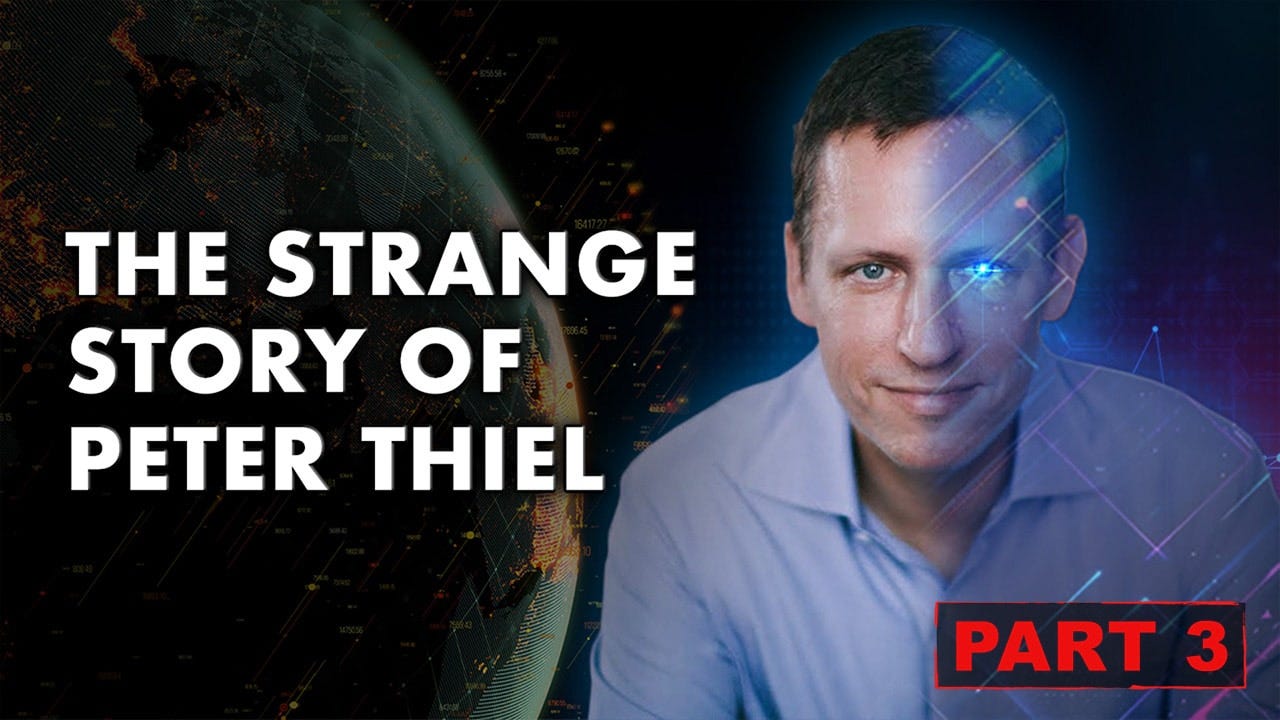
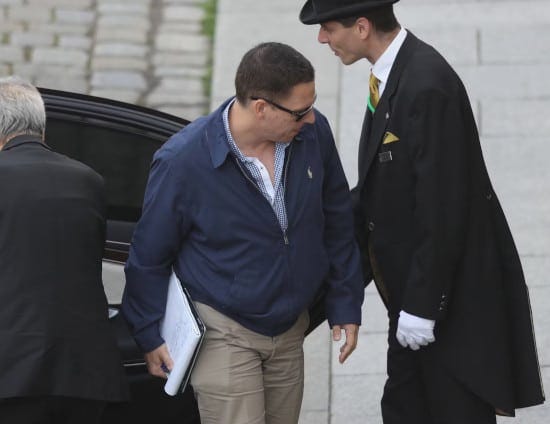

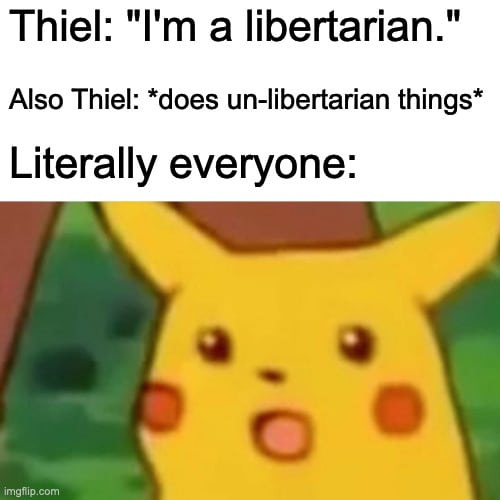
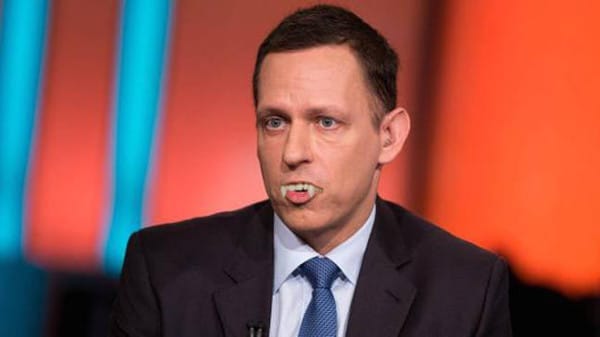

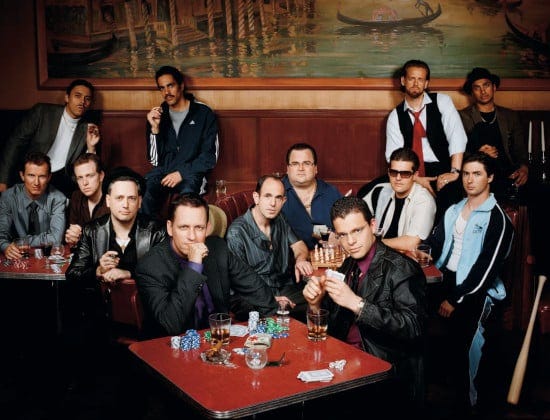
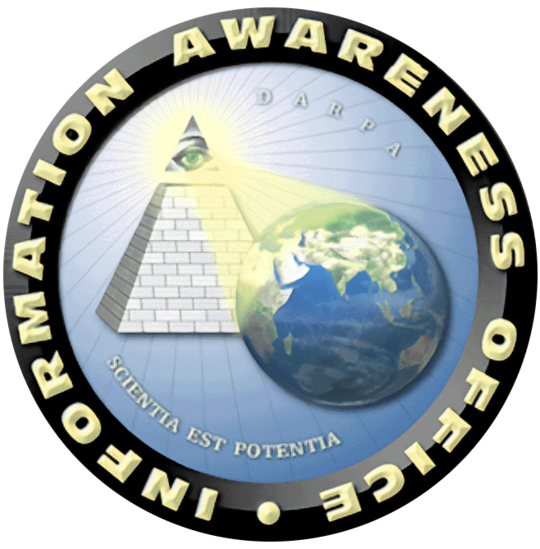
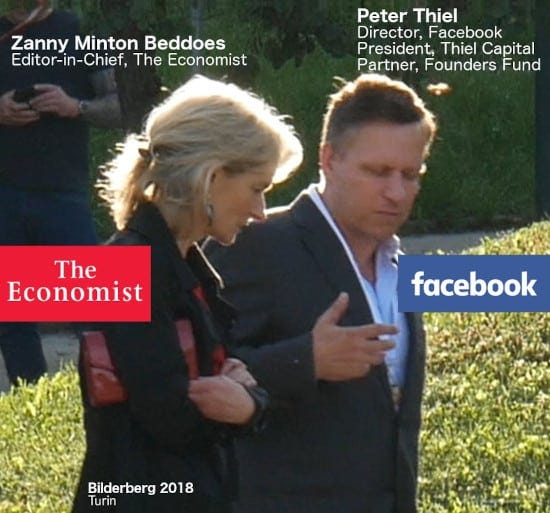
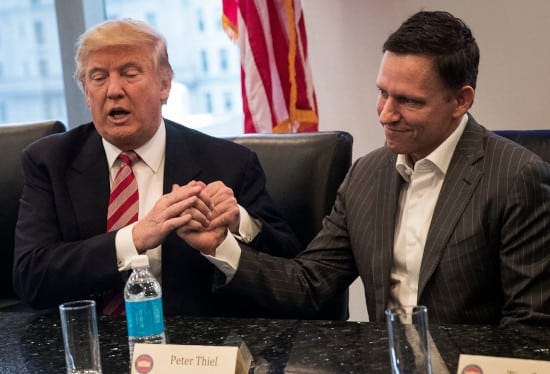

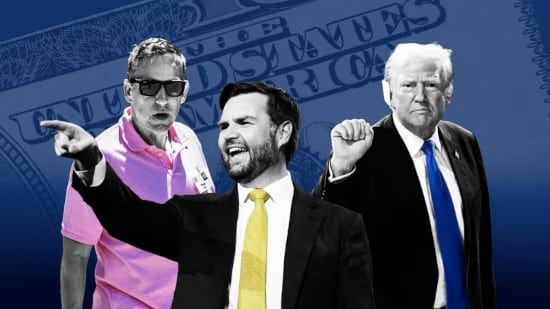

No comments:
Post a Comment